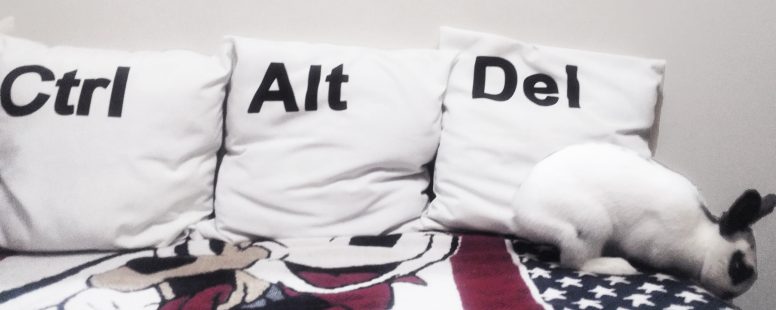Omission as Resistance
Let’s say we’ve established that the world sucks and we are thus motivated to do something about it. Let’s accept that resisting sucky forces is a way of “doing something”. One of my preoccupations is to reshape my own notions of resistance and subversion from something that is loud, in-your-face, and angry to something that is more quiet, mundane, but still angry, aka. something I have the capacity to participate in. Omission as resistance arises from these meditations as the expression of “doing something” that best suits myself.
Omission is the void we leave by not fulfilling what’s expected of us and resistance is the intentionality thereof. In fact, our first premarital counseling session went something like this:
“Who will (verb) the car?”
“Who will (verb) the house?”
“Oh, let us guess, the answer for, ‘who will make the bed?’ is, ‘we won’t have a bed’.”
Are we being contrarian? If by contrarian you mean opposing popular opinion because it’s popular, then no. However, omission as resistance is necessarily a reactionary. It requires a history of inherited baggage, or “popular opinion”, to react against. If “home ownership” (including its associations with investment/general financial prudence rather than mere shelter) weren’t an expectation of my subculture, it wouldn’t be considered resistance to not be working towards home ownership. The fact that these were assumptions in our premarital counselling curriculum at all is a testament to that expectation.
According to this philosophy, as demonstrated by our counseling session, my current life plan is to do nothing, achieve nothing, question “doing” and “achieving” altogether. Being a negative person (I literally speak in sentences that are littered with negatives, not to mention, any positive statements are scaffolded with caveats, contingencies, conditions), I’m hardly surprised that I found a way to live with myself that justifies my desire to “do something” with multiple refusals to do other things, in other words, by doing nothing.
I’m incredibly lucky to be in the position to justify doing nothing, so I’m ashamed to admit that getting nothing done in a day has been surprising tiring. Omission as resistance is like walking in the reverse direction of an escalator; we’re literally going nowhere, but it still takes effort. Perhaps l shouldn’t be so ashamed or surprised, after all friction is all about energy loss to resistance; or as our premarital counselors warned, “Simplicity isn’t simple.”
The limitation of my method, however, is that I have defined myself a multiplicity of negations without being sure of what I stand for. For example, my current rationale for not having children is that (a) I hate the nuclear family; children are practically the mascot for the nuclear family. (b) We don’t live in vacuums and inherit historical baggage; historical baggage necessitates that my child would be raised in a nuclear family (even the idea that “my” child as somehow more mine than others, yuck). Then (c) omission as resistance means that I’ll opt out of having kids at all. Opting out is derived from being against something. Yet the negation of that which I’m against isn’t necessarily what I’m for–a world where my decision becomes the new “popular opinion” would mean the literal end of the human race. nbd.
Instead, omission as resistance needs to work in tandem with imagination as resistance. Following the previous example, imagination as resistance means that I see family in every human being. It means that I ought to put in the work I would have put into taking care of my “own” spawn, into taking care of “other people’s” spawn and work to make “it takes a village to raise a child” more than the platitude it is.
If omission as resistance is the work of maintaining distance from sucky worlds (necessarily negative), imagination as resistance is the work of world-building and finding alternatives to world suck (potentially positive?). If anything, omission as resistance is a coping mechanism to position my negative, cynical energy in the context of a grander narrative of a resistance proper that has the potential to be in the service of life.
I search for fugitive moments of entanglement in the midst of institutionalized alienation. These are sites in which to seek allies. One might think of them as latent commons. Latent in two senses: first, while ubiquitous, we rarely notice them, and, second, they are undeveloped. They bubble with unrealized possibilities; they are elusive… Thus, I characterize them in the negative: latent commons are not exclusive human enclaves, …are not good for everyone, …don’t institutionalize well, …cannot redeem us … Given this negative character, it makes no sense to crystallize first principles or seek natural laws that generate best cases. Instead, I practice arts of noticing. I comb through the mess of existing worlds-in-the-making, looking for treasures—each distinctive and unlikely to be found again, at least in that form.
Recommendations:
